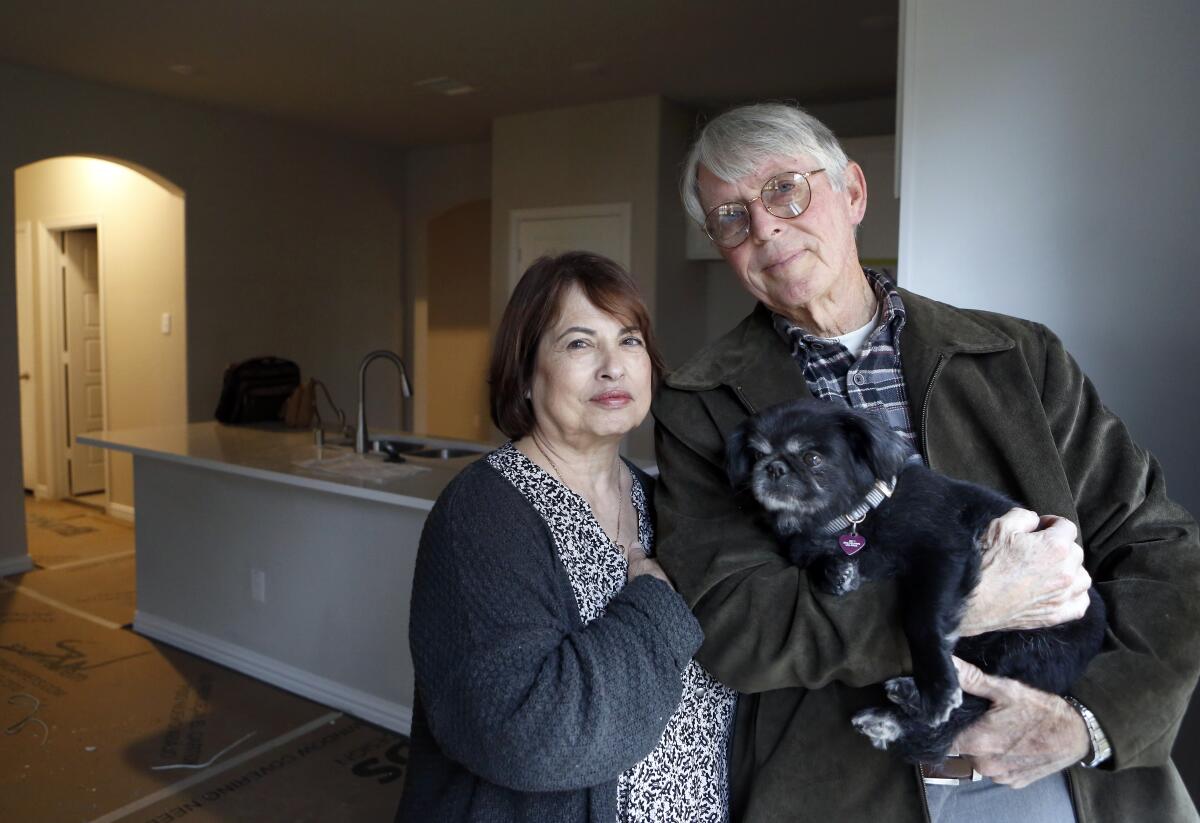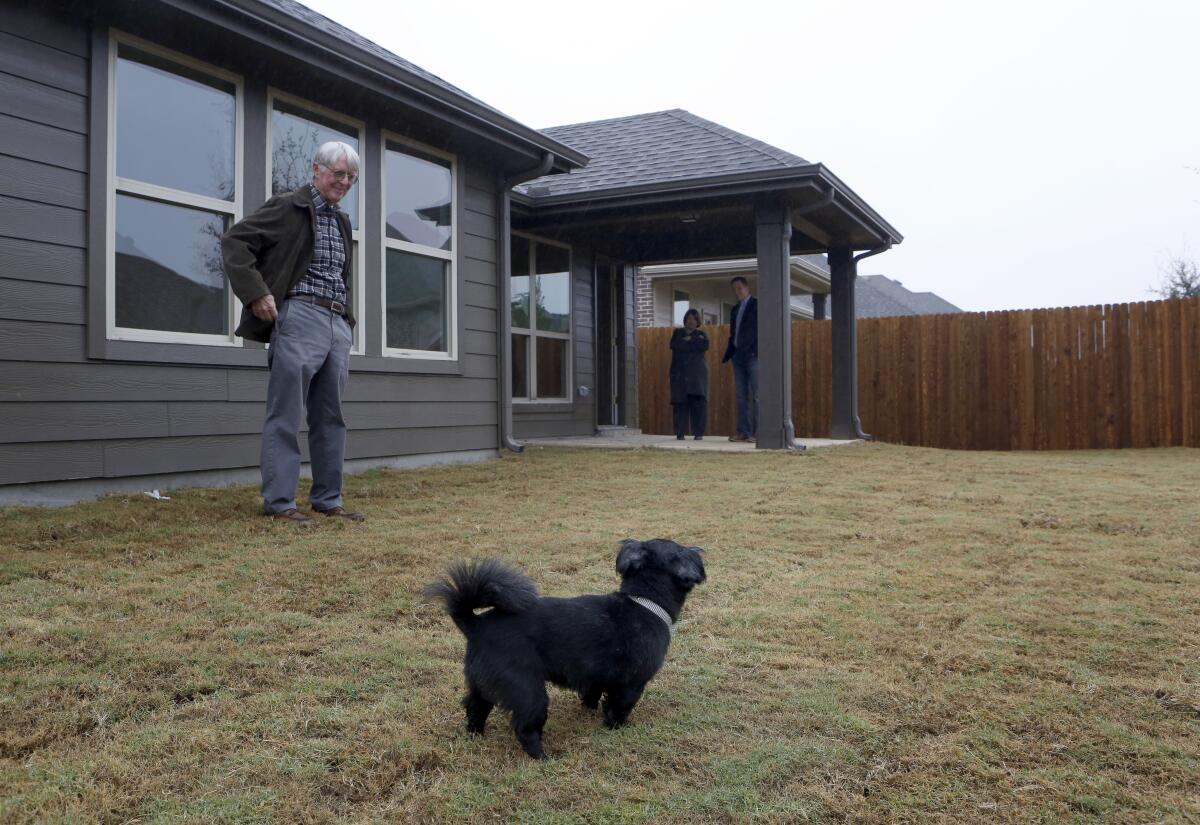California conservatives leaving the state for ‘redder pastures’

The Volkswagen SUV whizzed past the Texas state line, a U-Haul trailer in tow, as it made its way toward Amarillo.
“Yay!” Judy Stark cried out to her husband, Richard, as they officially left California. The pair bobbed their heads to ’50s music playing on the radio.
Like many voters who lean to the right in California, the retired couple have decided to leave the state. A major reason, Stark and her spouse say, is their disenchantment with deep-blue California’s liberal political culture.
Despite spending most of their lives in the Golden State, they were fed up with high taxes, lukewarm support for local law enforcement, and policies they believe have thrown open the doors to illegal immigration.
Just over half of California’s registered voters have considered leaving the state, according to a UC Berkeley Institute of Governmental Studies poll conducted for the Los Angeles Times. Republicans were nearly three times as likely as their Democratic counterparts to seriously have considered moving — 40% compared with 14%, the poll found. Conservatives mentioned taxes and California’s political culture as a reason for leaving more frequently than they cited the state’s soaring housing costs.
High taxes. Stifling regulations. Exorbitant housing costs. Freeway gridlock. Fires and floods.
Stark and her husband decided it was time to put their Modesto home up for sale about six months ago. After doing some research online, she came across the website Conservative Move, which, as its name suggests, helps conservatives in California relocate from liberal states to redder ones, such as Texas and Idaho.
Pulled over at a Pilot truck stop just outside Amarillo, Stark said she was excited to be hours from their final destination, Collin County, near Dallas. The pair purchased a newly constructed three-bedroom home in McKinney for about $300,000. In much of California, Stark said, a similar home would run about twice as much.
“We’re moving to redder pastures,” Stark, 71, said by phone. “We’re getting with people who believe in the same political agenda that we do: America first, Americans first, law and order.”

Between 2007 and 2016, California lost 1 million residents to domestic migration — about 2.5% of its total population, according to a 2018 report from the state Legislative Analyst’s Office. Texas was the most popular destination. A 2019 relocation study by Texas Realtors found that 63,175 Californians moved to Texas in 2017, while California was the top destination for Texans to move — nearly 41,000 relocated here.
Despite overall out-migration from the state, California has been gaining people with higher incomes. The Bay Area has absorbed most of the influx of those residents.
Over the last decade, the Legislative Analyst’s Office report said, the state added about 100,000 residents with household incomes of $120,000 or higher. About 85% of these higher-income earners moved to the Bay Area counties of Alameda, Contra Costa, San Francisco, San Mateo and Santa Clara.
But California’s soaring real estate costs also have sent many residents fleeing to more affordable regions. The three-member Bailey family moved to Prosper, Texas, in 2017, seeking a reprieve from Southern California’s high price tags. Marie Bailey and her husband, Scott, owned a home in Orange County and rented a place in El Segundo to be closer to Scott’s workplace in Santa Monica.
“To buy a house there [El Segundo] is insane,” Marie Bailey said. “It’s like $1 million. Why are we working our butts off for a fixer-upper in El Segundo? We’re just working, working, working — and for what?”
A Realtor, Bailey launched a Facebook group for others who were struggling with the same problems and looking to make a change. Her “Move to Texas From California!” group now has more than 14,000 members. Most, Bailey said, lean to the right, as she does — though not all.
In California, Bailey said, she felt that she had to hide her political beliefs. To build a more inclusive online community, she has laid down a few ground rules, including “no insulting or going overboard with political conversations.”
“I wouldn’t be one to put up a Trump sign, even here,” Bailey, 40, said. “But in your town Facebook, people would be like, ‘We know who the Trump supporters are.’ I had friends who voted for Trump and went to work the next day and pretended they didn’t.”
Bailey said she’s helped about 40 families move to Texas in the last year.
“There are hundreds more who made the move who didn’t use my real estate services but are in the group,” she said. “Tons and tons of families are moving all the time. People are posting photos of their families waving goodbye.”

Nicole Rivers and her husband put their Clovis home on the market in April, and hope to close escrow soon. They plan on flying to Texas to look for a place to rent in the eastern part of the state, near Tyler, coming back to California and then driving to their new home.
Rivers, who recently quit her job as a medical assistant and phlebotomist, said the cost of living is so much lower in the Tyler area that she can afford to stop working and dedicate herself to being a stay-at-home mom.
Her husband works in the oil fields, she said, and was already splitting his time between his job in Pennsylvania and family in California. When he had the chance to transfer to Texas full time, they jumped on it.
The 37-year-old said she wants to live in a town where the family can save money and her husband can retire sooner.
“It’s just too expensive here in California,” said Rivers, a California native. The state’s politics have “really gotten out of hand,” she added. She doesn’t support the state’s restrictive gun laws, she said, or the controversial sex education framework California approved despite protests earlier this year.
Academic specialists say that while it’s easy for people to talk about wanting to move to like-minded communities — or to “sort” themselves politically — it’s not clear how often their migrations are based on politics alone.
“Actually moving is much more high-cost,” said Ryan Enos, a professor of government at Harvard University. “That doesn’t mean some won’t eventually move, but the evidence that people move solely based on politics is low.”
Most people, he added, care more about the quality of schools, affordable housing and the overall quality of life when they consider a move.
Clayton Nall, an assistant professor of political science at Stanford University, said it’s “very possible” that the Republicans who want to leave California may decide to move for the reasons Enos noted — such as affordability — while blaming Democrats for those problems they see in the state.
“But it’s important to put in context that they are not the only people who are leaving,” Nall said. “Their reason may not be the main reason people are leaving California.”
Indeed, the Berkeley IGS poll found that 82% of the 18- to 29-year-olds considering leaving the state cited housing costs as a reason, as did nearly 80% of 30- to 39-year-olds.
State politics weren’t the driving factor behind Lisa Woolery’s move. Her family left California because they felt they weren’t “thriving” in Orange County. In 2018, she and her husband — who died recently — sold their home near Tustin and bought one in Johnson County, Kan., that was almost double the size but about half the price, she said.
“There were so many stressors — traffic, taxes,” Woolery said. “The cost of living is so expensive. To fill up my tank here in Kansas is almost half of what it was in California. I feel like we get more for our taxes here than in California.”
Although she didn’t leave the state because of politics, Woolery said that “it was nice to come to a place where whether you were a Democrat or Republican, you feel respected.” Southern California, she felt, wasn’t an inclusive place where it’s possible to have a “differing opinion.”
“If I said I was a Republican, or I voted for Donald Trump, I would get comments like, ‘Oh, I didn’t think you were a racist,’” she recalled.
Woolery quit her job when they moved to Kansas, leaving a post in public relations that paid about $150,000.
“It just seems so weird to me that I could take $150,000 out of my life and we could move somewhere and have a better lifestyle,” Woolery said.
One big draw of her new neighborhood is the ease with which she can sign up her children — a 12-year-old son and 10-year-old daughter — for extracurriculars and summer programs. In their old school district, she said, she would have to leave work early and be on top of every deadline to ensure they had a slot.
In Kansas, she signed her kids up for camp the week before they left.
“I’m really happy my husband and I sat back and evaluated our lives and said, ‘Something is missing,’” she said. “And thought big enough to do something to make it so our family was thriving.”
More to Read
Sign up for Essential California
The most important California stories and recommendations in your inbox every morning.
You may occasionally receive promotional content from the Los Angeles Times.












